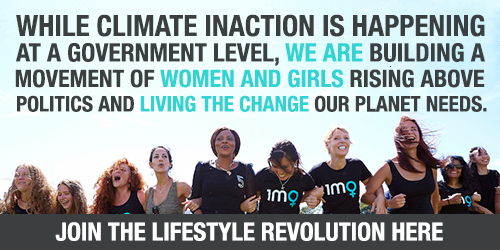I started watching the tv series Reprisal on SBS on demand the other day (a free to air TV channel here in Australia). It's kind of ok but this isn't a review for that. I was halfway through the first episode when I realised I'd been on Instagram the whole time and hadn't watched a second of my laptop. So I started the episode again.
This got me thinking of the not so sexy world of my digital footprint. I've never really thought about how my online habits contribute to my carbon footprint. I read an article from Fortune (probably while I was watching the first episode of Reprisal again), and discovered that the data consumed by streaming the song "Despacito" which has over 5 billion views on Youtube, is theoretically enough energy to power 40,000 homes in a year. Yikes! It's an ok song though, but this isn't a review of that either. According to the BBC, data centres now account for about 2 per cent of all electricity use in the US. That's roughly equivalent to the carbon emissions from the aviation industry. We're all pretty reliant on smart devices and saving and working in the cloud (I don't understand it either, don't worry), we're accessing these data centres which have a huge environmental impact.
I'll be honest with you, I'm not sure I've got an answer to how we can curb our collective internet habits, especially right now. Our lives are so tied to the digital, it's impossible to just unplug and disconnect. But in my quest to be the best environmentalist I can, I decided to audit my day to try and find the moments where I consumed things online and how I could be a better digital consumer. Striving to consume less and better seems like a good place to start.
Weekday Audit
Here's what my day looks like (don't judge me):
7 am: Wake-up!! I normally do a quick jump rope workout and stream a podcast. The podcast goes for 30 minutes (that's just a brag that I skipped for 30 minutes).
8 am: Two eggs and homemade bread for breakfast (I got on the home baking focaccia train eventually).
9 am -10 am: Start work, the laptop is overloaded - I've got 3 different work chats, my emails, photoshop, in addition I work in social media so I've got Instagram open the whole day, I'm storing my data for photoshop in the cloud, and we normally have a team zoom meeting that goes for 40 minutes.
10 am: Coffee. I thought about making one of those funny 'hook it to my veins comments'. But I didn't, you're welcome. I'll check Instagram while the kettle boils.
10.15 am - 1 pm: Back on-line. Approximately 17 tabs open at this point. Music is coming from somewhere.
1 - 1.30 pm: Cook a quick pasta lunch - store-bought pasta so there's plastic packaging. And I scroll through insta while I'm eating (I know!).
1-30 - 5.30 pm: Back to work. I watched a youtube tutorial on photoshop because I forgot how to use the program that I use every day. Somehow the amount of tabs has doubled. I send a few emails (50 grams of C02 for emails with attachments).
6 pm: Close all apps on the computer, shut the lid and run away.
6 -7 pm: I go for a walk, I streamed an entire album on Spotify (yes, it was all Glee cover songs).
7 pm: - 7.30pm: Dinner.
8 pm: I did a make-up tutorial on youtube. I watched it 3 times while trying to copy the "quick 5-minute smoky-eye". It took much longer.
9 pm: I watched two episodes of Normal People on Stan (gave up on Reprisal, sorry. Still not a review of that). I slipped once and found myself responding to someone on my phone.
10.30 pm: I responded to a few messages on messenger and Instagram before going to bed around 11 pm.
So short of tallying up the hours (it would make me feel sad), I spend a lot of time in the digital world. I'd hazard a guess that I'm probably closer to the higher end of the spectrum just as a result of working in the digital space. And it's quite tricky to get an accurate understanding of your online footprint. Companies like Google, Amazon and Netflix don't share their data publicly (although this report from Greenpeace does have some good insights and a campaign to get Netflix to go green!). But shying away from pessimism, here are some my humble suggestions for making your digital habits a bit cleaner.
Streaming Netflix? Download it instead.
Generally speaking, downloading instead of streaming has a lower carbon footprint. Especially, if you're going to stop and start the stream and also if you want to watch it again. According to Netflix, watching TV shows or movies on Netflix uses about 1 GB of data per hour for each stream of standard definition video, and up to 3 GB per hour for each stream of HD video. Let's take the popular show Gossip Girl. I calculated that it would take 3 days, 14 hours and 43 minutes (roughly 87 hours) to watch all of Gossip Girl from start to finish. So using the EPA calculator, if 100,000 people watched all of Gossip Girl from start to finish the carbon emissions are equivalent to 20,675 passenger vehicles being driven every year.
So first of all, let's try and reduce our streaming print! If you're not fussed on HD, opt for the lower quality. You can download most Netflix shows (lots of other streaming services do this too) to your phones, tablets, on the Netflix Windows app on a pc, and if you're on a Mac, why not download the file on your phone, and then airplay to your computer (no it's not that difficult, don't give me that look). If all that went over your head, ask a tech savvy friend or family member to show you. And put your phone down while you're watching. Actually, put it in another room.
Streaming music/podcasts?
See the above paragraph. A whole bunch of songs are on high repetition in my list so I download them to my phone. It really is embarrassing how many Glee songs are saved on my phone, but I'm doing it for the environment. You can too.
Using the internet for work and keeping in contact with people?
Remember how I just said Google and other large companies aren't exactly transparent about how their data centres work? Don't wait around to find out and swap to a planet-friendly search engine. We wrote an article on some of our favourite ones here. For example, Ecosia invests 80% of the profit they make from advertisements into planting trees in desert areas. There's an easy fix for you. I'll admit I was worried when I first started using it, but it operates the same as Google.
It's a bit difficult to keep our online time down right now, but lockdowns are slowly easing all over the globe. As we start to emerge back into reality, a lot of us have been wondering how we can be kinder to the environment. Try and take into account how you consume media online, and make sure you're not creating digital waste by consuming media you're not listening to / watching or engaging with. You know that show, you don't like but keep watching? Time to get off the internet.


